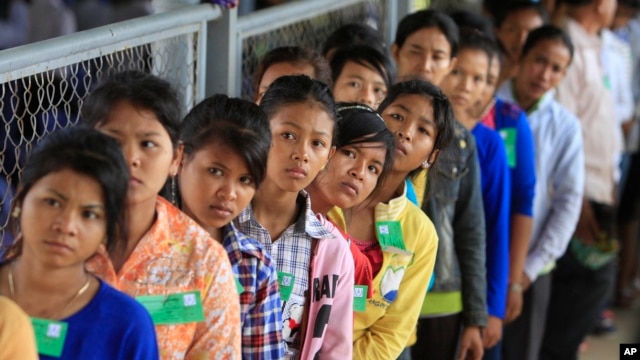Cambodian villagers line up at an entrance before the final
statements from Nuon Chea and Khieu Samphan at the U.N.-backed war
crimes tribunal in Phnom Penh. VOA file.
Analysts: UN-Cambodia Trial Agreement Positive Step
Voice of America Khmer | 3 February 2014
In a meeting last week between the U.N.’s top legal diplomat, Miguel de Serpa Soares, and Cambodian Cabinet Minister Sok An, the two sides agreed to continue to fund the court and cooperate on conducting trials.
The U.N.-backed court has faced ongoing financial woes in recent months as it seeks to conclude the initial trial of two aging Khmer Rouge leaders.
The Cambodian side of the hybrid court has faced ongoing criticism of mismanagement, corruption and political interference. The court itself has handed down only one conviction since its inception in 2006.
John Ciorciari, a professor of public policy at the University of Michigan and co-author of a new book, "Hybrid Justice," says the agreement should restore confidence from international donors and is a sign for the tribunal to move on to other cases.
“The timing is perfect for both sides to cooperate now because there is something that both want and that is for the court's next phase of operation to go smoothly, the phase leading to the first verdict in case 002,” he said.
But Peter Maguire, author of “Facing Death in Cambodia,” says that while the agreement is a positive development, he is cautious about the prospects for further trials because of the age of the elderly Khmer Rouge leaders.
"I think it’s a very positive thing and you know if the U.N. can move faster, they can at least complete parts of these trials within the lifetime of the defendants. As far as further trials, I am not optimistic,” he said.
Nuon Chea and Khieu Samphan, both in their 80s, are the only senior Khmer Rouge leaders alive and considered fit to stand trial.
The first phase of the trial, dealing with the forced evacuation of Phnom Penh in April 1975, concluded in October. Both defendants deny the charges against them and a verdict is not expected until later this year. The scope of the second phase has not yet been determined.
Youk Chhang, Executive Director of the Documentation Center of. Cambodia, said it is not clear how future cases will go forward.
"The investigations seem to be getting very long and without a clear strategy to finish when," said Chlang. "That is the tricky part. Even though both sides are now in agreement to work together, this still remains to be worked out between the two parties. So I urged [the] two parties to quickly establish an exit strategy as soon as it can be done.”
Sum Rithy, one of the rare survivors from a notorious Khmer Rouge prison, says he still holds out hope that justice will be done.
“As I have said for a long time, the process of trying Khmer Rouge leaders will not be inactive or die away, "said Rithy. "The U.N. and Cambodia are making efforts to find justice for the victims of the Khmer Rouge regime.”
As many as two million Cambodians died from starvation, overwork and executions during the four-year rule of the Khmer Rouge, which attempted to create an agrarian communist utopia.
The group's leader, Pol Pot, died in 1998 and co-founder Ieng Sary died earlier this year.
Former Khmer Rouge prison chief Kaing Guek Eav, better known as "Duch," was sentenced last year to life in prison for his role in killing more than 14,000 while running the Tuol Sleng torture and execution center in Phnom Penh.



No comments:
Post a Comment